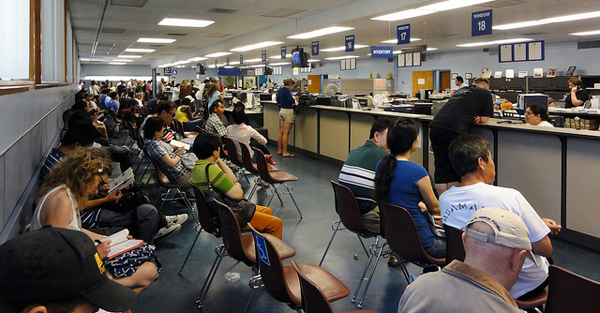The point is that the vision of hopeless government isn’t grounded in personal experience, let alone data. At this point it’s a cultural cliche, or a projection by people who read Atlas Shrugged in their teens and never grew up.Of course, there were no "data" in Krugman's piece one way or the other. And by "personal experience" Krugman means "his" personal experience not "my" personal experience or "yours." Obviously, "his" personal experience is real and accurate. Mine and yours amount to a bogus "cultural cliche." Therefore, Krugman implies, social and economic policy in these United States should rightly be legislated based on "his" personal experience which is uncorrupted by perpetual, childish fantasy.
In other words, Krugman is saying that any American citizen who has had a bad personal experience visiting their local DMV, Post Office, VA hospital, IRS or Social Security office is delusional. According to Krugman, DMV employees are "generally helpful and the lines...moved fast." Thus, Americans should expect new and burgeoning federal behemoths like Homeland Security and ObamaCare to be like the DMV: models of efficient and effective customer service.
Hundreds of individuals in the comment section of Krugman's article agree with him. Apparently, libertarians and conservative Republicans are delusional, driven by emotions and ideology rather than fact and reality, mislead by biases against democratic government and influenced by wealthy corporate interests. On the other hand, liberals and progressives are extremely educated, street-smart and grounded in reality.
Meanwhile, over at Rasmussen Reports, we learn that 17% of likely American voters believe that the era of big government is over. Another 28% are undecided.
You explain it. I can't. Is almost half of the American electorate blind, stupid or both? All I know for sure is that libertarian politicians have their work cut out for them. How do you reason with voters, almost half of whom are numbskulls?
As for Krugman, Chico Marx said it first in Duck Soup: "Who are you going to believe, me or your own eyes?"
Actually, whether or not the lines at the Post Office move as fast as the lines at Federal Express is beside the point. Individuals patronize Federal Express because they want to. They spend money at the Post Office because they have to. Federal Express has customers. The Post Office ministers to a captive audience.
Krugman won his Nobel Prize in economics. Rather than boasting about how helpful employees keep the lines moving at the DMV, you'd think he'd be asking himself why DMV's in their present form exist in the first place. Ultimately, that is the single and distinctive difference between government agencies and private enterprises. Every day a private business exists in the free market, the entrepreneur who owns it must justify its existence and its method of operation. If he doesn't, a competitor will.
If Krugman had lived in socialized Italy during the middle of the last century, no doubt he'd write a column praising railroad conductors for being helpful and Mussolini for keeping the trains running on time.
Talk about missing the point!
